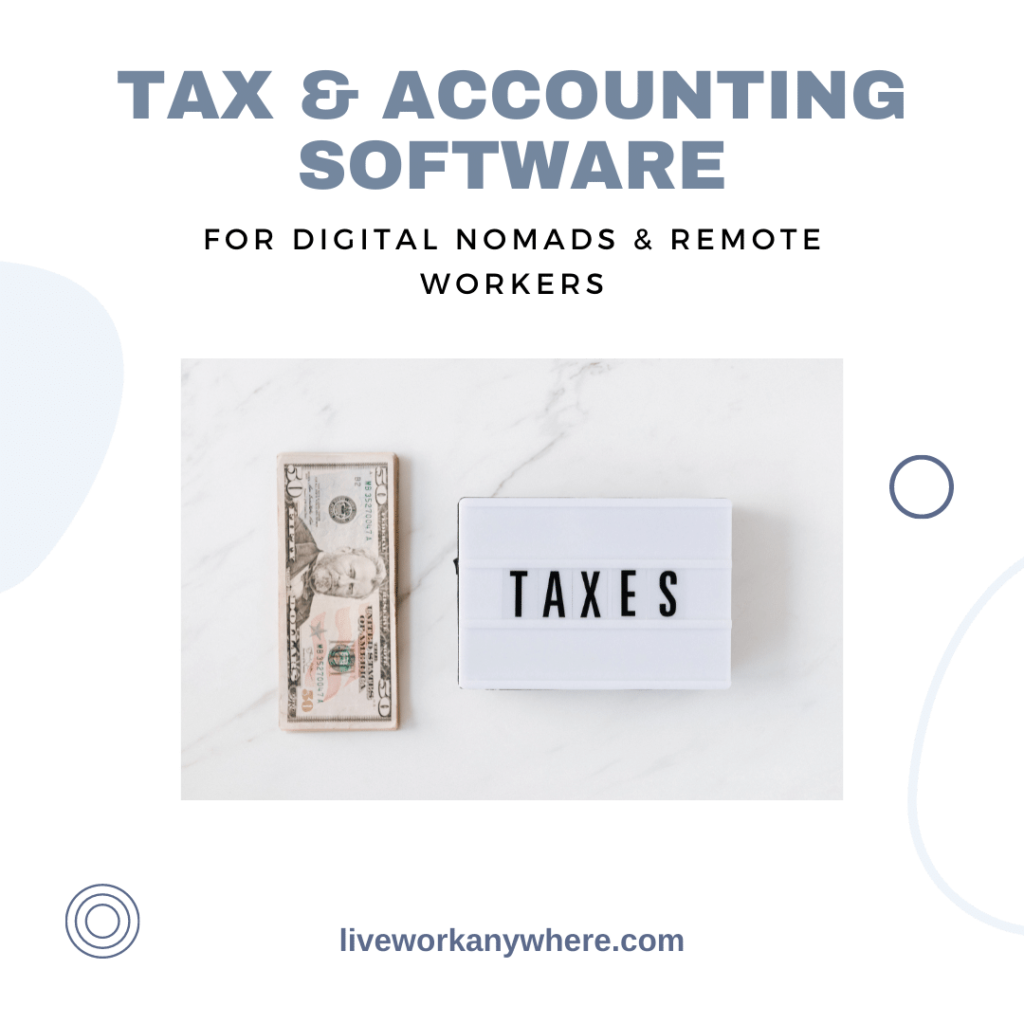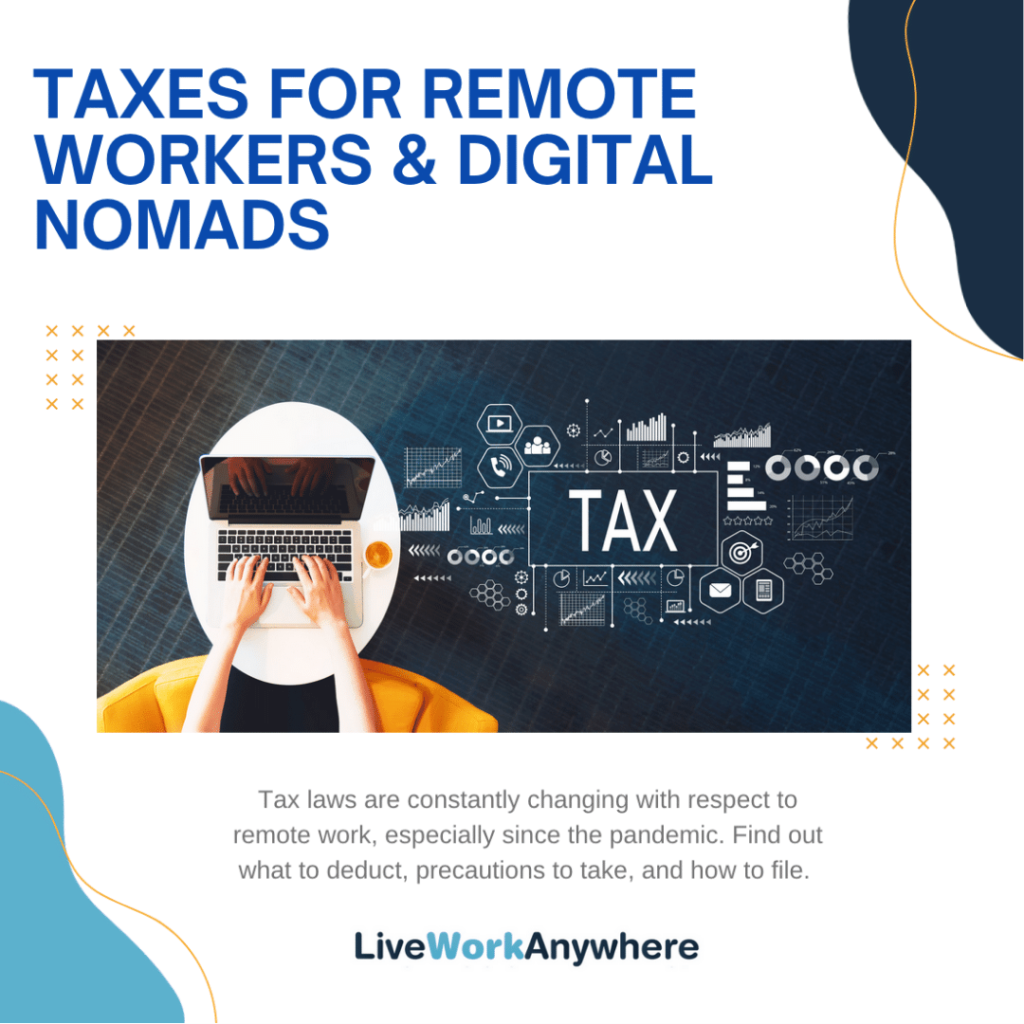Ah, the dreaded tax season. The good news is if your taxes are fairly straightforward, you can file your taxes online pretty easily. We’ve assembled a list of the best tax software for remote workers and digital nomads. Save time and stay on top of taxes – so you can get back to living and working from anywhere!

Best Tax Software for Remote Workers and Digital Nomads
First, before you begin filing your taxes at home or in foreign countries, you must be organized. Staying on top of your taxes and business activities throughout the year makes it easier to e-file, get your tax returns (or know what you owe) more quickly, avoid missing tax obligations, and protect your financial accounts from double taxation.

Organizing your taxes
A simple way to organize your taxes is to keep a spreadsheet or notes of major purchases throughout the year. I use Google Sheets to list out expenses and income and any major purchases related to business.
Tips for organizing your taxes
Using a Google Sheet helps me not only with U.S. taxes but also with foreign taxes and other taxable income especially while living abroad. It also guides me in managing my budget, particularly when it comes to health insurance options, state taxes when I’m on the move within the country, and even my tax benefits.
I separate income: business income, 1099 and/or W2 income, and rental income. I also separate my expenses: maintenance/repairs, software and tools, and so on.
Any time I have a major purchase or repair, I go to the sheet and jot it down so I don’t forget. As a digital nomad and business owner, you need all the tax deductions you can get!
Tax filing for W2 Employees
If you don’t have a business and are a W2 employee, filing taxes online will be straightforward. You will need to get a copy of your W2 from your employer.
Software for W2 Employees
Companies may use a service like Gusto or ADP for processing payroll. You may also use a service like Expensify for reimbursements. Note that if the company does not report the reimbursements, you may not need to either. Instead, you can take advantage of the $1,800 / year allotted standard deduction.

Tax filing for Independent Contractors (1099)
If you are an independent contractor, you will have self-employment taxes. This means you will have more tax deductions to consider.
It’s nice getting a large check for your total hourly rate without taxes deducted.
However, working remotely as digital nomads also means that you need to be conscientious of filing taxes and tracking your worldwide income (from foreign assets or foreign taxes paid) – or you can quickly end up behind Uncle Sam.
For some reason, I always choose to learn the hard way. This was true in terms of getting behind on taxes. “Leap and the net will appear” – while motivating, it does not apply to taxes.
So, now, I generally subtract and set aside 30% from the total amount received for paying the IRS. I know, it’s hard, when you could be investing in Bitcoin instead. But, pay now or pay later. Trust me.
Luckily, with tax deductions, you can reduce your percentage or tax bill owed. But not completely.
Accounting Software for Remote Workers and Digital Nomads
To keep more diligent track of your expenses, you’ll want to move from spreadsheets to accounting software. Some accounting software also allows you to file your taxes while monitoring your bank account. But for simplicity, we’ve first listed the best accounting software.

Benefits of Accounting Software
If you’re working remotely, you probably already have a slew of apps/software you use each month for your job or online business.
So it makes sense to simplify your life and go digital in all areas, including accounting software. No paper receipts!
Benefits of accounting software:
- Linking your bank accounts
- Keeping everything in one place
- Be prepared for tax season
- Know what you’re owed or the amount you’ll pay taxes
Note: Something I also learned a little late – never co-mingle your funds. Always have a separate account for business and personal.
This makes filing and reconciling sooo much easier. Recently, I changed from having all my accounts at Bank of America (I originally did this, even with high fees, for international reciprocity) to Mercury.
Mercury is very simple to set up – all online – and easy to use, unlike traditional banking software.
List of the Best Accounting Software
Quickbooks
An industry leader for a reason, Quickbooks makes it easy to set up your tax filing system. They have options for simple tax prep or more in-depth tax reporting.
Quickbooks Self Employed
If you are self-employed and want to take advantage of all your deductions, then QuickBooks Self-Employed is the software for you.
If you have employees, QuickBooks also makes it easy to manage payroll tax filings.
Xero
Xero is another market leader, quickly on the tails of Quickbooks. Xero allows business owners and digital nomads to easily track expenses and differentiate between personal or business-related transactions. Xero makes it easy to reconcile your taxes by setting up rules.
An example of a rule might be to group all gas stations into one category. This makes it easy to quickly reconcile the name and category of the expense.
Bench
If you don’t want to do accounting and prefer someone else to manage it for you, there’s a solution. Bench.co is a startup that specializes in accounting software and tax filing.
Bench has a managed service along with its software. Meaning, along with accounting software, they also provide you with a team of accountants.
An added bonus is that you can ask them for advice at any time. Not the cheapest, but if you prefer to have someone else manage your accounting – Bench is a great option.
Expensify
An important part of tax preparation is keeping your receipts and tracking your expenses.
Luckily, there’s a solution to paper receipts – Expensify. Keeping track of your receipts as you go will save so much time and hassle later on.
Best Tax Filing Software for Remote Workers & Digital Nomads

Remote workers and digital nomads can use tax filing software to file tax returns without having to be in one place (yay, work from anywhere!).
For remote workers, filing taxes, keeping track of foreign taxes paid, generating a foreign bank account report for foreign accounts, or just checking for potential double taxation can be challenging.
Tax software is an effective solution to most of the problems involving filing taxes. Tax software allows digital nomads to fulfill their tax obligation by providing a secure, convenient, reasonably priced, and easy-to-use platform.
Benefits of tax software:
- Basic tax filing with tax deductions
- Beginners can file taxes online without any tax knowledge or experience
- Free tax return filing and tax support throughout the whole process
- Basic tax filing with tax deductions
Let’s take a look at a few.

Free Tax USA
Started by a CPA in 2001 and IRS-approved, FreeTaxUSA has become one of the top tax filing software. It’s the best tax software for tax filers with simple tax returns. And, just like the name says, you can use FreeTaxUSA 100% free for your Federal returns.
FreeTaxUSA also guarantees that you’ll get the maximum return if you use their software. Not bad for free!
There are two editions – Free and Deluxe.
FreeTaxUSA – Free Edition
The free edition is easy to use, unlike other free tax software, and good for novices with simple returns.
You pay nothing for preparing and e-filing your federal return, and up to $14.99 for each state filing.
FreeTaxUSA includes IRS forms including Schedules A, B, C, D, E, and K. These forms cover a wide range of situations and complexity, like online business and freelance income. Also, deductions related to your home office.
All of your data is stored in the cloud. This makes it super easy to come back each year and use your previous year’s data. This is a huge time saver for tax preparation.

You can also import from other tax programs like TurboTax, TaxAct, and H&R Block to get your data.
The free edition has great customer support and typically produces a response within 24 hours (even on weekends). All help is provided by email.
If you want to receive priority support, which you may need for more complicated taxes or to avoid an IRS audit, you need the Deluxe edition.
TaxFreeUSA – Deluxe Edition
If you’ve ever been audited then you know the nightmare of having to go back through every single receipt, deduction, claim, form, and so on. HR Block says “On a scale of 1 to 10 (10 being the worst), being audited by the IRS could be a 10”. So, yeah, don’t get audited.
Benefits of the Deluxe edition include:
- In-house Audit Assist program that provides access to audit specialists
- Priority support, including Live Chat during business hours
- Unlimited amended tax returns
The Deluxe Edition costs $6.99 for federal returns and $12.95-$14.99 for state taxes. The main advantage of the deluxe plan is the audit assistance and live support. Taxes are not easy, so having someone on your side can really help. Especially for only $6.99.

Did I mention that they guarantee you’ll get the maximum refund?
Try FreeTaxUSA.
TaxSlayer
I’ve listed TaxSlayer first because it’s the best tax software for freelancers or self-employed people. Typically, this software is for digital nomads and freelancers who have some experience filing their taxes online.
TaxSlayer has some of the cheapest prices and they offer a free tax filing service.
TurboTax
Similar to TaxSlayer, TurboTax is another good option for people who have some experience in tax preparation. Both companies offer cheap prices, but I personally like how TaxSlayer helps throughout the entire process.
TurboTax tax filing software makes it easy to file your tax returns from anywhere as long as you have internet access.
H&R Block Tax Software
H&R Block tax filing software is for those who want the most comprehensive and accurate services possible, without having to pay hugely expensive fees. They also have a network of over 10,000 office locations across the US.
H&R Block tax software can find deductions that other tax services might not be able to. Deductions can save you thousands of dollars in taxes owed.
TaxACT
TaxACT is tax software for people with simple tax returns who cannot or do not wish to file online. But, still need an easy-to-use program that will guide them through the whole process step by step.
Jackson Hewitt
Tax obligations can be complicated for freelancers working remotely and digital nomads with investments or rental properties. If you’re living in a foreign country or have foreign accounts, making worldwide income, you may want to consider hiring a firm. Tax firms help reduce your risk.

Jackson Hewitt allows you to file and pay taxes in person as well as online – by yourself or with a tax professional.
Tax preparation fees vary depending on what you need. If you want to avoid your annual income being double taxed, paying too much in capital gains, social security tax, and corporate tax, as well as know how to deal with foreign taxes (and U.S. taxes), tax treaties, foreign assets, foreign tax credit, foreign earned income exclusion, and other complicated matters – Jackson Hewitt has the expertise to help you through these things.
It’s not the cheapest, but having a tax advisor for a complicated tax situation or tax bill is worth the money spent.
Liberty Tax:
Liberty Tax is similar to Jackson Hewitt in that it has both online options to file taxes as well as a network of local offices around the country.
This is particularly convenient for digital nomads and remote work employees who need help with their diverse earned income.
I personally have had a tax advisor from Liberty Tax for years, and she owns two local offices.

Many digital nomads or remote work employees abroad can benefit from extra tax advice. It is relatively easy to file online even if you’re in a foreign country.
However, when you have income from remote work in multiple states or multiple employers, property tax, health insurance, stocks, rentals, capital gains, various financial accounts and properties, multiple online businesses with remote employees – you really need a tax expert.
With Liberty Tax, you can file online, request a virtual tax pro (which I love and is great for American digital nomads) or go into an office location.
Conclusion
Taxes are complicated, full stop. If you are a digital nomad, work remotely / work abroad, are living abroad, and have multiple businesses and/or assets, it thickens the plot.
Having tax software to file online is important when all you do is live and work from anywhere. FreeTaxUSA is the best software for free filing online.
If you want to seek the advice of a tax expert, then you will also want to look at Jackson Hewitt or Liberty Tax. Having someone to help advise you on your taxes while also filing online can save you many headaches during tax season whether you’re filing U.S. taxes or foreign taxes.


